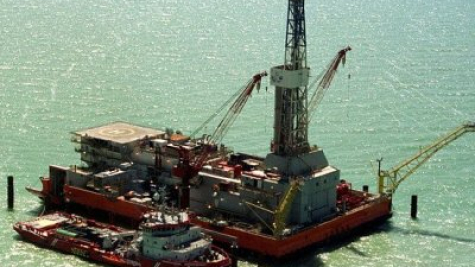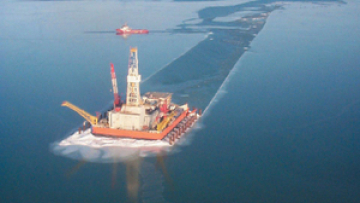Project – On record
This profile is no longer actively maintained, with the information now possibly out of date
Project – On record
This profile is no longer actively maintained, with the information now possibly out of dateWhat must happen
| Sectors | Oil and Gas Extraction |
| Location |
|
|
|
This project has been identified as an Equator Project |
Phase I of Kashagan’s development has been extended twice, and current reports put the end of Phase I and the beginning of commercialization anywhere from 2008 to 2011. Construction costs have spiraled from $27 billion to $60 billion in 2006. In July 2007, the latest projection made by the consortium was $136 billion.
In addition to the offshore extraction itself, a number of supporting infrastructure projects throughout western Kazakhstan and the Caspian Sea, pose great environmental and social risks. These projects include the development of the Bautino Supply Base north of Aktau, the Koshanai Cuttings, Oily water treatment Facility (near Bautino) the construction of the Bolashak Onshore Processing Facility (commonly called the Karabatan Refinery, the largest processing area ever planned) near Atyrau, oil pipeline construction and extension projects, and a future trans-Caspian transportation system linking Kashagan to BP’s Baku-Tbilisi-Ceyhan pipeline.
Kashagan and its supporting infrastructure projects combine a dangerous mix of new untested technologies, a fragile environment, a multinational oil consortium operating under a confidential agreement with the government of Kazakhstan and the prospect of financing by the world’s largest international finance institutions.
Social and human rights impacts
Kashagan not only threatens the environment, it also threatens the livelihoods of millions of residents of the Caspian region. Oil development in the north Caspian places the tourism and fishing industries at risk and prevents investment in other economic ventures that could contribute to the sustainability of the region.
Though Kashagan’s expected profit is approximately $600 billion, 90 percent of residents in the nearby oil boomtown of Atyrau live below the poverty line (the corresponding figure for the country as a whole is 20 percent). According to unofficial data, unemployment in Atyrau is at 70 percent.
Environmental and climate impacts
The Kashagan oil field is located within a protected territory—the shallow nature reserve zone of the north Caspian Sea. Most notably, the endangered sturgeon migrate through this area to their spawning grounds, the endangered Caspian Seal’s whelping grounds are found here, and numerous bird species migrate through this area.
The shallow water depths (2-10 meters) and extreme weather conditions (summer highs of 45 degrees Celsius/winter lows of –40 degrees Celsius), create a situation in which oil extraction and transport is extremely difficult and bears high risk of causing irreparable environmental devastation.
Of particular concern are the winter ice floes that threaten to overrun the artificial islands constructed for extraction activities and the undersea pipelines that transport the crude to shore. In 2005/2006, construction was forced to stop for four months due to ice movement.
Further complicating matters, Kashagan crude contains high levels of sulphide impurities, which must be removed before oil can be exported. Sulfur removal is extremely polluting, and carries major risks for nearby communities. According to local experts interviewed during the most recent FFM (September 2007) a technology good enough to allow a sustainable treatment of sulphur emissions and storage may not exist at the moment.
Adding concern to the project is the fact that Agip KCO and the Kazakhstan Ministry of the Environment are in conflict regarding a waste management plan for the project, despite the fact that the PSA requires zero discharge. There is also no emergency plan for local residents living near the Karabatan Refinery.
Finally, there has been little to no project information made available to the public despite repeated requests from local activists, and the public was not involved in the development of the project’s Environmental Impact Assessment.
Japan’s JBIC provided financing for Phase 1, including a $649 million loan to INPEX North Caspian Sea co-financed by Japanese private banks (Mitsui, Mitsubishi and Mizuho) in November 2005.
In January 2006, KazMunayGaz concluded a US$ 800 million one-year bridge loan with a banking syndicate arranged by BNP Paribas, Citi and Société Générale to finance its 8.33% stake in the Kashagan consortium.
In November 2006, the EBRD pledged to finance construction of the Bautino Supply Base, making it easier for private banks, particularly Equator Principle signatories to join a project finance deal. Export credit agencies are also likely to become involved.
On 19 January 2007 Project Finance International (PFI) reported that KazMunaiGaz was seeking a financial advisor to help structure its $1.6 billion project financing for Kashagan.
In March 2007, Banktrack members CRBM and FoE France, together with Crude Accountability and Atyrau based NGOs: Globus, Tan and Caspian Press Club, wrote to the private banks potentially involved (see documents). With its reply dated March 6th 2007, BNP Paribas confirmed to be the leading structuring bank. In the meantime, Citigroup was setting the environmental standards for Kashagan as a Category A project. In the letter BNP Paribas stated: "As far as the Kashagan project is concerned, the structuring banks (Citigroup, BNP Paribas and Société Générale) are requiring that for the financing to be put in place, provisions should be include for the project to be compliant with the Equator Principles. This will entail the preparation and public disclosure of a full Environmental and Social Impact Assesment (EISA) and associated Action Plans to comply with IFC Performance Standards and World Bank/IFC Pollution Prevention and Abatement standards. The structuring banks will also require that this transaction's environmental and social documentation be subject to independent review by a qualified firm acceptable to them."
However, the bridge loans provided turned up to be guaranteed by the parent company KazMunayGaz and therefore, the project now is part of corporate finance rather than project finance so, it would not be considered in the scope of the Equator Principles anymore.
In September 2007 the deal was refinanced by a US$1.05 billion-15 month loan from a banking syndicate arranged by the mentioned bridge loan banks. This loan will mature at the end of December 2008. The following banks participated in the banking syndicate: Bank of Tokyo-Mitsubishi UFJ, BNP Paribas, Citi, DZ Bank, HSH Nordbank, ING Bank, KfW, Mizuho Bank, Natexis, Societe Generale and Sumitomo Mitsui Banking.
Kazakh state energy firm KazMunaiGas repaid the US$1 billion loan provided by BNP Paribas, Societe Generale, and Citibank NA Bahrain in September 2007 for the development of the Kashagan field ahead of time (October 2008) (International Herald Tribune).
Kashagan Oil Project - Kazachstan
Five kilometres of indifference
"Taman: The Edge of the World"-Trailer
Extracting troubles
Silence is Betrayal
2011
2011-06-28 00:00:00 | Latest update
Recently, ExxonMobil has been offered $5 billion for half its 16.8 percent stake. It is argued that if Exxon is to sell anything to ONGC, which made the bid, it would sell the whole stake rather than only part, since it is unlike Exxon to reduce itself to such a small interest (all major Kashagan shareholders hold 16.8 percent, making Exxon an equal partner).
On May 26th, 2011, it was announced that at the end of the month Royal Dutch Shell will shut its Caspian office for the Kashagan oil field. This decision is explained to be "putting the crucial $50bn project on ice for at least two years" and said to be based on the decision made by the Kazakh government to reject a new lower-cost design. To find out more, please go here.
In July 2010, KazMunaiGas announced that the second phase of development of the Kashagan oil field has been postponed until 2018-2019. The delay would also affect the start of the Kazakh Caspian Transport System (KCTS), designed to carry Kazakh oil across the Caspian to Azerbaijan and on to foreign markets.
On November 5, 2009 Italy's Eni group and Kazakhstan's London-listed KazMunaiGas signed a preliminary agreement that could result in up to $50bn of investments in Kazackstan's upstream and downstream oil and gas sectors. This memorandum of understanding signed in Rome reflects Eni's growing ambitions in the region and Kazakhstan's intention to move away from being just an exporter of raw materials and to lessen its dependence on Russia. The four-part agreement includes construction of a gas sweetening plant in Kazakhstan. The MOU also foresees upgrading Kazakhstan's Soviet-era Pavlodar refinery, construction of a shipyard on the Caspian, and joint Eni-KazMunaiGas exploration of the Isatay and Shagala oil blocks in the Caspian.

